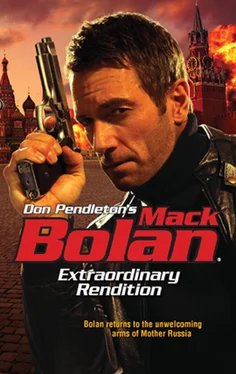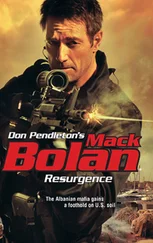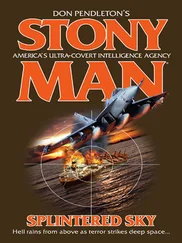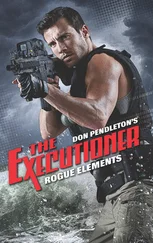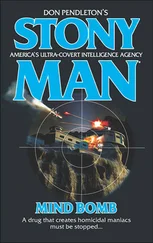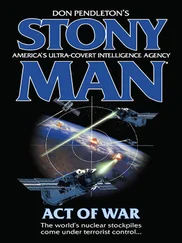When they were safely locked inside the shop, its owner introduced himself as Fedor Tsereteli. He spoke fluent English without asking why it was required, and Bolan saw him file that fact away for future reference.
So be it.
“You have need of special merchandise,” he said.
“That’s right,” Bolan replied.
“Please follow me.”
He led them from the main showroom into an office, where a bank of filing cabinets stood against one wall. At Tsereteli’s touch, two of them swung aside, revealing a smallish door secured by a locking keypad. Tsereteli blocked their view with his bulk while he punched in the code, then opened the door. Beyond it, stairs descended to a darkened cellar.
Tsereteli found a light switch, and fluorescent fixtures came alive downstairs. Bolan ducked his head, going through the doorway, and made his way down to the gun vault.
The place had something for everyone: assault rifles and submachine guns, light machine guns and squad automatic weapons, shotguns and pistols, RPGs and rockets, crates of ammunition and grenades. Bolan browsed, taking his time.
His final selections included a Steyr AUG assault rifle, a familiar Beretta 93-R selective-fire pistol with sound suppressor, a Mikor MGL 40 mm grenade launcher, plus spare magazines, ammunition and a selection of hand grenades from Tsereteli’s stockpile. Accessories included a shoulder rig for the Beretta, a tactical vest and a Cold Steel Recon Tanto dagger with a black epoxy finish on its seven-inch blade.
“All this?” Pilkin asked him, surveying his selections with a raised eyebrow.
“You’re traveling a little light yourself,” Bolan replied. “Want something for the road, on me?”
Or, rather, on the two Colombians he had relieved of half a million dollars when he punched their tickets outside Baltimore, two days before his meeting with Brognola in D.C.
With visible reluctance, Pilkin checked Tsereteli’s wares and chose a Vityaz submachine gun, model PP-19-01. It resembled an AKS-74U compact assault rifle, but the Vityaz was chambered in 9 mm Parabellum, fed from 30-round box magazines, with a cyclic rate of 750 rounds per minute. Its stock folded against the gun’s left side when not in use, and special clips held a spare mag in place beside the one in use.
“That’s it?” Bolan asked.
“Everything my heart desires,” Pilkin told him, frowning.
“Then,” he said, “we’re good to go.”
LEONID BEZMEL wasn’t woken by the purring telephone. A nocturnal creature by disposition and necessity, he rarely went to bed before sunrise, and then didn’t wake until noon, unless some dire emergency compelled it.
“Hello,” he said without enthusiasm.
“Have you found out any more yet?” Gennady Sokolov asked.
“Nothing beyond what we discussed,” Bezmel said.
“How can that be possible?” Sokolov asked.
“Nothing from the police beyond the basics,” Bezmel said. “When they know something more, I’ll pass it on to you, of course.”
“And in the meantime, he’s still out there. With this woman. Doing who knows what.”
“Perhaps they’re having sex,” Bezmel suggested.
“I don’t find that amusing,” Sokolov replied.
“You’re asking me to read this stranger’s mind and tell you where he’s gone with yet another stranger. I can’t do that. I’m investigating, but I will not feed you bullshit just to pacify you. Okay?”
“Four of your men are dead.”
“While helping you,” Bezmel reminded Sokolov. “And still I do not understand how this applies to me.”
“Permit me to enlighten you,” Sokolov said. “If the Americans take me, they will be taking those associated with me—or, at least, delivering their evidence to prosecutors here. Director Bortnikov would love to mount your head in his Lubyanka trophy room. So would General Nurgaliyev, at the Ministry of Internal Affairs. Perhaps they’ll fight over the scraps.”
“Is that supposed to frighten me, Gennady?”
“I make no threats,” Sokolov replied.
“That’s very wise. Because you know I’ve seen policemen come and go. Some are dismissed, others retired in luxury. A few…have accidents.”
“Now you would threaten me?”
“By no means. We are friends, Gennady. Better yet, we’re partners. I would hate to see that ruined by a moment’s panic over nothing.”
“Nothing? With your men dead and this man running loose?”
“I’ll find him. Don’t you worry. No one hides from me in Moscow. He’ll be gone before you know it.”
“I already know it, Leonid.”
“Then, by all means, endeavor to forget him. He’s the next best thing to dead.”
“Make him the best thing, eh? And then we’ll celebrate.”
“Concerning that,” Bezmel digressed, “is everything prepared?”
“It will be, when you’ve solved our problem.”
“IT SEEMS we are about to start a war,” Anzhela Pilkin said when they were on the road again.
“A small one, if we’re lucky,” Bolan said. “But I’ll be ready, either way it goes.”
“I thought this was supposed to be a simple thing. Extract one man. Deal with his guards if necessary and move on.”
“Eight men already tried the ‘simple’ route,” Bolan replied. “They’re dead. I don’t intend to join them if it isn’t absolutely necessary.”
“You would die to catch Gennady Sokolov?”
“It isn’t on my list of things to do,” Bolan said, “but the risk is there on any mission. Same with you, I’d guess.”
“Sometimes,” she granted. “But I do more paperwork than shooting. This night is unusual.”
“It’s bound to get worse,” Bolan said. “You can still pull the plug.”
“Pull the…?”
“Hit the silk. Call it off.”
“I have orders,” she said.
“To meet me and serve as my guide, am I right? Some translation? I’m betting that no one told you to go out and get killed.”
“I’m not planning on it.”
“No one plans it, except suicides,” Bolan said. “Here’s the deal. I intend to flush Sokolov out of his hole, whatever it takes. I’ll be starting with those who support him, his partners and friends. They’ll be loyal to a point, but beyond that, self-preservation kicks in. When he’s flushed out of cover, I’ll grab him and pass him along to the transporters.”
“You make it sound easy.”
“That’s just my point,” Bolan replied. “It isn’t. It gets harder, bloodier, with every step we take from this point onward. You don’t have to make that trip. I do.”
“I won’t go back to headquarters and say you’ve talked me out of my assignment. That is unacceptable.”
“If you go, there’ll be a point where you can’t change your mind,” said Bolan.
“Is this chivalry?” Pilkin asked. “Or are you looking out for number one again?”
“What difference does it make?”
“I’m curious.”
Red Square was passing on their left. Somewhere inside its walls, Vladimir Lenin lay entombed, preserved since 1924 with semiannual baths in potassium acetate, alcohol, glycerol, distilled water and, as a disinfectant, quinine. Others were almost equally revered but buried more conventionally, barred from public viewing—Mikhail Kalinin, titular head of the Supreme Soviet from 1919 to 1946. Felix Dzerzhinksy, founder of the Soviet secret police and Gulag. Konstantin Chernenko, known as “Brezhnev’s Shadow,” who engineered Russia’s boycott of the 1984 Olympic games.
“I have no wish to see you killed or maimed,” Bolan replied at last. “If that’s what you call chivalry, I guess I’m guilty. On the other hand, self-preservation means I won’t have time to coddle you if you go forward.”
“You believe that is what happened tonight?” she challenged, sparking anger.
Читать дальше
